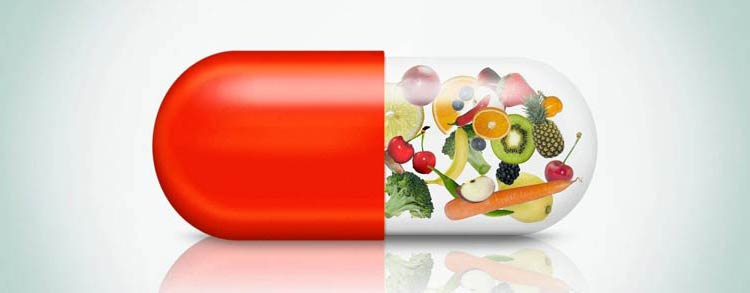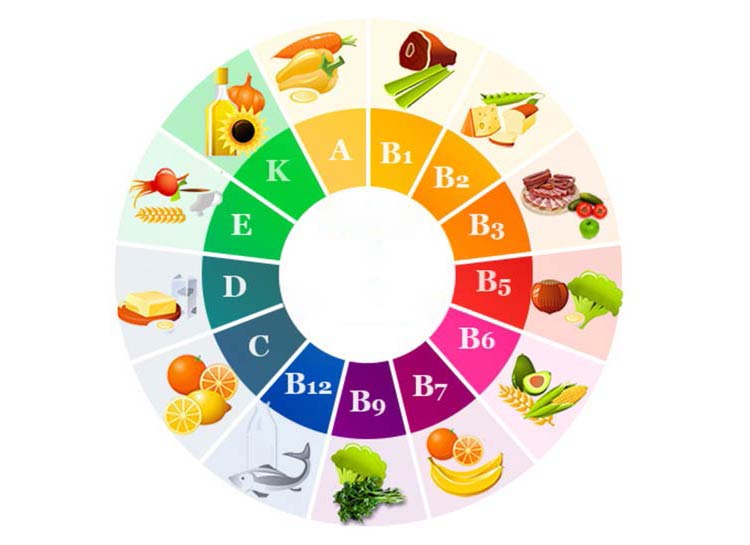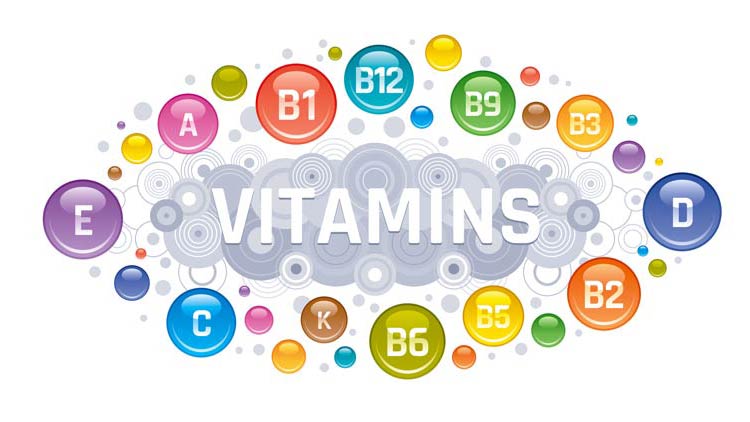Role of Vitamins in Human Life
Vitamins are tiny molecules of immense importance – like sparks igniting the engine of the human body. They are essential for proper functioning, from building immunity to supporting mental health. Divided into two main groups – fat-soluble and water-soluble – they play diverse roles, and their dietary sources are key to vitality.
Vitamins are organic compounds necessary for the proper functioning of the body, which the human body usually cannot synthesize itself and must obtain from food. They do not provide energy or build cells, but they must be supplied through diet because the body does not synthesize them or does so insufficiently. We invite you on a journey through the world of vitamins, where we will discover how these micronutrients support life and where to find them!

Classification of Vitamins
Vitamins are divided into two groups depending on their solubility, which affects how they are absorbed and stored in the body:
- Fat-soluble (A, D, E, K)
They accumulate in adipose tissue and the liver, which is why their excess can be toxic. They require dietary fats for absorption. - Water-soluble (C and B group)
They are not stored in large amounts, and their excess is excreted in urine. They need to be supplied regularly because the body uses them quickly.

Roles of Vitamins and Their Sources
Fat-Soluble Vitamins
Vitamin A (retinol, beta-carotene)
- Role: It is the guardian of vision and skin. It supports vision in low light, strengthens the immune system, and helps in the regeneration of skin and mucous membranes. Beta-carotene, a provitamin A, acts as an antioxidant, protecting cells from damage.
- Sources: Poultry liver, cod liver oil, carrots, pumpkin, spinach, kale, sweet potatoes.
Interesting fact: An excess of vitamin A can be toxic, but beta-carotene from plants is safe – the body converts it to vitamin A only in the required amount.
Vitamin D (cholecalciferol)
- Role: The queen of bones and immunity. It regulates calcium-phosphate metabolism, strengthening the skeleton and teeth. It also supports the immune system and may reduce the risk of depression.
- Sources: Fatty fish (salmon, mackerel, sardines), egg yolks, fortified dairy products. Crucial is also skin synthesis under the influence of UVB rays – 15-30 minutes of sun exposure daily is sufficient (depending on skin tone and time of year).
Interesting fact: In many countries, vitamin D deficiency is common due to the low amount of sunlight in the autumn-winter period, which is why supplementation is often recommended.

Vitamin E (tocopherol)
- Role: An antioxidant protecting cells from oxidative stress. It supports healthy skin, blood vessels, and fertility.
- Sources: Nuts (almonds, hazelnuts), sunflower seeds, vegetable oils (sunflower, wheat germ), avocado, spinach.
Interesting fact: Vitamin E works in tandem with vitamin C, enhancing its antioxidant effects.
Vitamin K (phylloquinone*, menaquinone**)
- Role: Essential for blood clotting and bone health. It helps in binding calcium in bones and prevents calcification of blood vessels.
- Sources: Green leafy vegetables (spinach, kale, broccoli), natto (fermented soybeans), liver. Partially produced by intestinal bacteria.
Interesting fact: Newborns receive vitamin K immediately after birth to prevent bleeding.
* Phylloquinone (fitomenadion) is another name for vitamin K1 – one of the important vitamins that helps our body function properly. It is mainly found in green vegetables such as spinach, broccoli, and lettuce.
**Menaquinone (menachinon) is another name for vitamin K2 – a form of vitamin K that is very important for our body’s health. Vitamin K2 primarily helps with two things: blood clotting and maintaining strong bones by supporting processes related to calcium, and it also prevents calcium from depositing where it shouldn’t, such as in the arteries.

Water-Soluble Vitamins
Vitamin C (ascorbic acid)
- Role: The hero of immunity and regeneration. As a powerful antioxidant, it protects against free radicals, supports collagen synthesis (crucial for skin, joints, and blood vessels), and improves iron absorption. It prevents scurvy.
- Sources: Acerola cherries, rose hips, blackcurrants, red bell peppers, kiwi, citrus fruits, parsley.
Interesting fact: Vitamin C is sensitive to high temperatures, so it is best to eat raw fruits and vegetables.
Vitamin B1 (thiamine)
- Role: The engine of carbohydrate metabolism. It supports the nervous system and muscle function, preventing diseases like beriberi.
- Sources: Whole grain products, pork, legumes, nuts.
Interesting fact: Alcohol and excess sugar can increase the need for thiamine.
Vitamin B2 (riboflavin)
- Role: Participates in energy metabolism, supports healthy skin, eyes, and mucous membranes.
- Sources: Dairy products, eggs, offal, almonds, mushrooms.
Interesting fact: Riboflavin deficiency can cause cracking at the corners of the mouth.

Vitamin B3 (niacin)
- Role: Crucial for metabolism and skin health. Its deficiency leads to pellagra (symptoms: dermatitis, diarrhea, dementia).
- Sources: Poultry, fish, peanuts, whole grain products.
Interesting fact: The body can synthesize niacin from tryptophan, an amino acid present in proteins.
Vitamin B5 (pantothenic acid)
- Role: Participates in hormone synthesis and metabolism. Supports the regeneration of skin and mucous membranes.
- Sources: Offal, eggs, avocado, broccoli, mushrooms.
Interesting fact: The name “pantothenic” comes from the Greek “pantos,” meaning “everywhere,” because this vitamin is widespread in food.

Vitamin B6 (pyridoxine)
- Role: Supports protein metabolism, the production of red blood cells and neurotransmitters, supporting the nervous system.
- Sources: Bananas, potatoes, chickpeas, poultry, fish.
Interesting fact: Vitamin B6 may alleviate symptoms of premenstrual syndrome.
Vitamin B7 (biotin)
- Role: The secret to beautiful hair, skin, and nails. Participates in the metabolism of fats and carbohydrates.
- Sources: Egg yolks, nuts, soybeans, yeast. Partially produced by the intestinal flora.
Interesting fact: Raw egg whites can bind biotin, reducing its absorption.

Vitamin B9 (folic acid)
- Role: Crucial for DNA synthesis and cell division. Essential during pregnancy to prevent neural tube defects in the fetus.
- Sources: Green leafy vegetables, beans, lentils, fortified grain products.
Interesting fact: Synthetic folic acid is better absorbed than natural folates* from food.
* Folates are natural B vitamins that help the body create new cells and are very important for health, especially for pregnant women. You can find them in green vegetables, fruits, and legumes. Thanks to folates, our body can grow and develop properly, and they also help prevent certain birth defects in children.
Vitamin B12 (cobalamin)
- Role: Essential for the production of red blood cells, the functioning of the nervous system, and DNA synthesis. Its deficiency causes megaloblastic anemia and neuropathy.
- Sources: Animal products (meat, fish, eggs, dairy). Vegans are recommended to supplement.
Interesting fact: Vitamin B12 is stored in the liver for up to several years.

Why Are Vitamins So Important?
Vitamins act as catalysts in the body, enabling hundreds of biochemical reactions. Without them, metabolism slows down, immunity weakens, and the risk of disease increases. For example, vitamin C deficiency once led to scurvy among sailors, and a lack of vitamin D can cause rickets in children or osteoporosis in adults. Conversely, an excess of fat-soluble vitamins (e.g., vitamin A) can be toxic, so balance is key.
Vitamin Deficiency and Excess
A complete lack of vitamins leads to avitaminosis, a deficiency to hypovitaminosis, and an excess to hypervitaminosis. Vitamins can be supplemented in various forms, such as tablets, capsules, syrups, or liquid vitamins, available in pharmacies and health food stores.
How to Ensure Adequate Vitamin Intake?
A balanced diet, rich in a variety of products, usually covers the need for vitamins. Key are vegetables, fruits, whole grain products, nuts, seeds, fish, meat, and dairy. In special cases – e.g., during pregnancy (folic acid), in vegans (B12), or in winter (vitamin D) – it is worth considering supplementation after consulting a doctor.
Summary
Vitamins are the invisible heroes of our health, working quietly to support every aspect of life – from strong bones to a sharp mind. By including colorful vegetables, juicy fruits, whole grain products, and healthy fats in your diet, you will provide your body with everything it needs. Remember: nature knows what it’s doing – just trust it and eat a variety of foods! And if you have doubts about whether your diet is complete, consult a dietitian to make sure every vitamin reaches your plate.

Recommended
- Number of neurons
- Charles Darwin
- Dian Fossey
- Jim Corbett
- Jane Goodall
- Human brain evolution
- Evolution theory
- Man a Social Being
- Why did humans lose their hair
- Sexual dimorphism


















